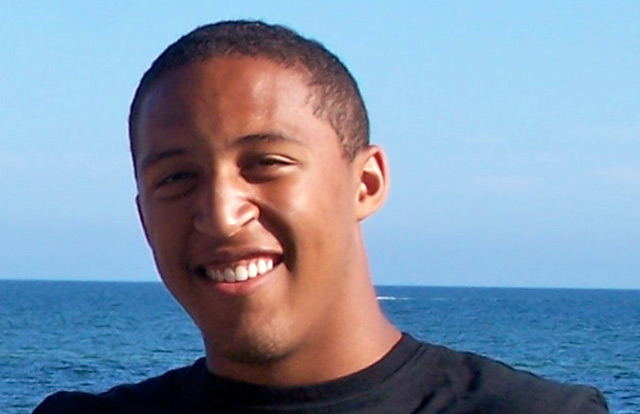Geyer Receives Goldwater Honorable Mention for Antimatter Research

By synthesizing the antimatter particle antihydrogen, physicists will have the ability to create a more accurate picture and explanation of the universe.
“Would antimatter fall down — or fall up?,” asks physics major Guy Geyer ’13. “If we could trap antihydrogen for a longer length of time, we could test the gravitational effects of the particle. This would certainly be what scientists aim to do in the end.”
Geyer, who studies antihydrogen at Wesleyan, received honorable mention for the 2011-12 Barry Goldwater Scholarship. He competed with 1,095 mathematics, science, and engineering students nationwide for the award.
Geyer began his antihydrogen research last summer under the direction of Reinhold Blümel, the Charlotte Augusta Ayres Professor of Physics. Since then, he has turned the project, titled “Antihydrogen Production in a Paul Trap,” into a successful thesis in partial fulfillment of the Informatics and Modeling Certificate.
While hydrogen is made of an electron and a proton bound together in orbit, antihydrogen consists of a positron (antiparticle of the electron) and antiproton. When the hydrogen and antihydrogen are brought into close contact, they will annihilate into energetic radiation with nearly perfect efficiency.
By producing it at a low enough energy where it can remain confined in the trap, physicists can use spectroscopy to measure its energy levels. Since antihydrogen is neutral, scientists could probe the gravitational effects of antimatter particles.
“In nature, antimatter that occurs naturally isn’t in a form that admits the measurements that need to be made, so that’s why its necessary to synthesize antihydrogen,” Geyer explains. “We need an antimatter particle that has a matter partner particle (i.e, antihydrogen-hydrogen), and is simple enough to synthesize, but complicated enough to be non-trivial.”
Antihydrogen studies also could aid potential space travel research.
“It has the potential to be used as the fuel for an engine more efficient than any we have now,” Geyer says. “This type of engine would mainly be aimed at space travel; don’t expect your next Prius to have an antimatter fuel gage!”
Geyer’s project consists of numerical simulations, which model the interactions of positrons and antiprotons particles of antihydrogen in a specific type of particle trap. After solving several equations describing the properties of the particles in the “Paul Trap,” he wrote a computer program that allowed him to explore different parameters of the system.
“The goal was to determine if the Paul Trap was a suitable trap in which to synthesize antihydrogen. To do this, I had to find the correct balance of parameters, and in the end we obtained positive preliminary results,” Geyer says.
Geyer will continue research in physics this summer in Yale University’s Electrical Engineering Department. He’ll be working in the general areas of quantum optics and photonics.
Next fall, Geyer will begin a new project – studying random matrix theory in glassy systems – with Tsampikos Kottos, associate professor of physics. While the project is still in its preliminary phase, he intends for it to develop into senior thesis work.
And then? Geyer plans to apply for Ph.D programs in one of his other interests – quantum computing and early universes particle physics and baryogenesis.
“At Wesleyan, I have had the fabulous opportunity to work very closely with my research advisor. I have that same kind of experience in my classes as well — the individualized attention has been something I have valued above all else,” he says.

